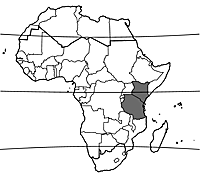Dasylepis integra (PROTA)
Introduction |
Dasylepis integra Warb. ex Engl.
- Protologue: Abh. Preuss. Akad. Wiss.: 44 (1894).
- Family: Flacourtiaceae (APG: Achariaceae)
Synonyms
- Dasylepis leptophylla Gilg (1908).
Origin and geographic distribution
Dasylepis integra is restricted to south-eastern Kenya and north-eastern Tanzania.
Uses
The wood is locally used for furniture, utensils, clubs and tool handles, and also as firewood.
Properties
The wood is moderately hard.
Description
- Evergreen shrub or small tree up to 15(–35) m tall; bole slender; bark surface smooth, becoming flaky, grey-brown, inner bark orange-red.
- Leaves alternate, simple; stipules early caducous; petiole 5–7(–10) mm long; blade elliptical to lanceolate or oblong, 8–16 cm × 2.5–6 cm, cuneate to obtuse at base, short-acuminate at apex, margins entire to remotely toothed, papery to thin-leathery, glabrous, pinnately veined with 5–9 pairs of looping lateral veins.
- Inflorescence a drooping axillary raceme up to 12 cm long, glabrous, laxly flowered.
- Flowers bisexual or male, regular; pedicel slender, 5–8(–20) mm long; sepals 3–4, slightly fused at base, rounded to elliptical, c. 5 mm long, pinkish-reddish, glabrous; petals 7–8, similar to sepals but slightly longer, more whitish and with basal hairy appendage inside; stamens 15–20, c. 5 mm long; ovary superior, glabrous, 1-celled, style very short, with 3 short branches.
- Fruit a globose capsule 1.5–2 cm in diameter, short-pointed, with 3–4 longitudinal grooves, glabrous, pale purple, tardily dehiscent with 3 valves, 1–2(–5)-seeded.
- Seeds ovoid-angular, 8–9 mm long, glabrous.
Other botanical information
Flushes of young leaves are reddish.
Dasylepis comprises 6 species and is related to Erythrospermum, Rawsonia and Scottellia. Dasylepis integra resembles Dasylepis racemosa Oliv., which is a small to medium-sized tree up to 20 m tall with bole up to 45 cm in diameter with a much larger area of distribution, from Guinea east to western Uganda and south to Gabon and DR Congo. Although uses of Dasylepis racemosa have not been recorded, its wood is possibly locally used for similar purposes as that of Dasylepis integra.
Ecology
Dasylepis integra usually occurs in the understorey of moist forest at 900–2250 m altitude. It is locally co-dominant.
Genetic resources
Dasylepis integra has a restricted area of distribution, which is severely fragmented. Therefore, it has been included in the IUCN Red List as vulnerable.
Prospects
The wood of Dasylepis integra will remain of limited importance for local applications. The small size of the bole makes that it has no prospects for the international timber market, and focus should be primarily on its protection.
Major references
- Lovett, J. & Clarke, G.P., 1998. Dasylepis integra. In: IUCN. Red list of threatened species. Version 2011.1. [Internet] http://www.iucnredlist.org August 2011.
- Lovett, J.C., Ruffo, C.K. & Gereau, R.E., 2003. Field guide to the moist forest trees of Tanzania. [Internet] Centre for Ecology Law and Policy, Environment Department, University of York, York, United Kingdom. 192 pp. http://www.cepf.net/ Documents/ Final_LovettRuffoGereau_FieldGuide.pdf. August 2011.
- Obama, C. & Breteler, F.J., 2004. A synopsis of Dasylepis Oliv. (Achariaceae) with a description of a new species from Lower Guinea. Kew Bulletin 59(4): 585–591.
- Sleumer, H., 1972. A taxonomic revision of the genus Dasylepis Oliv. (Flacourtiaceae). Botanische Jahrbücher für Systematik, Pflanzengeschichte und Pflanzengeografie 92(4): 554–561.
- Sleumer, H., 1975. Flacourtiaceae. In: Polhill, R.M. (Editor). Flora of Tropical East Africa. Crown Agents for Oversea Governments and Administrations, London, United Kingdom. 68 pp.
Other references
- Beentje, H.J., 1994. Kenya trees, shrubs and lianas. National Museums of Kenya, Nairobi, Kenya. 722 pp.
- Chase, M.W., Zmarzty, S., Lledo, M.D., Wurdack, K.J., Swensen, S.M. & Fay, M.F., 2002. When in doubt, put it in Flacourtiaceae: a molecular phylogenetic analysis based on plastid rbcL DNA sequences. Kew Bulletin 57(1): 141–181.
- InsideWood, undated. [Internet] http://insidewood.lib.ncsu.edu/search/. August 2011.
- Miller, R.B., 1975. Systematic anatomy of the xylem and comments on the relationships of Flacourtiaceae. Journal of the Arnold Arboretum 56: 20–102.
Author(s)
- R.H.M.J. Lemmens, PROTA Network Office Europe, Wageningen University, P.O. Box 341, 6700 AH Wageningen, Netherlands
Correct citation of this article
Lemmens, R.H.M.J., 2012. Dasylepis integra Warb. ex Engl. [Internet] Record from PROTA4U. Lemmens, R.H.M.J., Louppe, D. & Oteng-Amoako, A.A. (Editors). PROTA (Plant Resources of Tropical Africa / Ressources végétales de l’Afrique tropicale), Wageningen, Netherlands.
Accessed 3 June 2025.
- See the Prota4U database.

